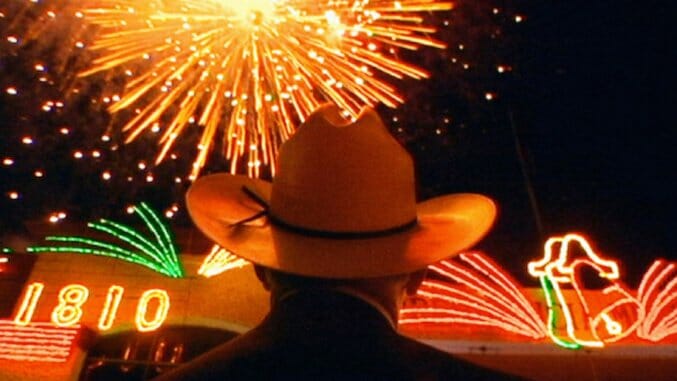Western

With 45365, Tchoupitoulas, and now Western, the Ross Brothers, Bill and Turner, are quietly developing a distinctive voice in the realm of nonfiction cinema: one that seeks the beauty in the everyday, shunning talking heads and polemical point-making in favor of intimate observation and expressive imagery. In 45365, this sensibility manifested itself in a portrait of a small Ohio town that fashioned unexpected poetry out of the mundane; in Tchoupitoulas, the Rosses discovered a child’s-eye-view lyricism out of three young boys’ late-night odyssey in a post-Hurricane Katrina New Orleans.
Western has many of the same virtues, but this time they filter it through a more overtly political lens. Broadly speaking, the film tackles the hot-button issue of security along the U.S.-Mexican border, especially in light of the increasingly violent drug wars south of the border. But instead of bringing us into the terrifying heart of the U.S.’s ineffectual war on drugs à la Denis Villeneuve’s fiction film Sicario, the Rosses explore this subject by examining a Texas town, Eagle Pass, which is right across from the Mexican town of Piedras Negras. The Americans and Mexicans in Eagle Pass seem to be coexisting just fine under the leadership of Mayor Chad Foster.
With his warmhearted, gregarious “aw shucks” demeanor, Foster exudes the kind of easy, inviting charisma that makes it understandable how he’s managed to reach across the cultural aisle and keep peace in this border town (the fact he also speaks fluent Spanish surely helps his cause). He’s not the film’s only subject, though: There’s also Martín Wall, a longtime cattle wrangler living in Eagle Pass whose other main passion in life is his daughter, Brylyn, whom he’s grooming to take up the family business.
Somewhat unusually for a Ross Brothers film, a dramatic arc of sorts develops: Thanks to a bout of gangland violence, the U.S. government orders cattle passage between Eagle Pass and Piedras Negras halted indefinitely. This has an especially detrimental effect on Martín, who finds his lifelong livelihood put on hold because of what he feels is basically politicians in Washington, D.C. flexing their muscles. The move frustrates Foster, too, but he tries his best to maintain stability between Eagle Pass and Piedras Negras, even after the Mexican town’s mayor, José Maldonaldo, is killed in a plane accident—until an incident late in the film shakes his resolve permanently.
-

-

-

-

-

-

-

-

-

-

-

-

-

-

-

-

-

-

-

-

-

-

-

-

-

-

-

-

-

-

-

-

-

-

-

-

-

-

-

-








































